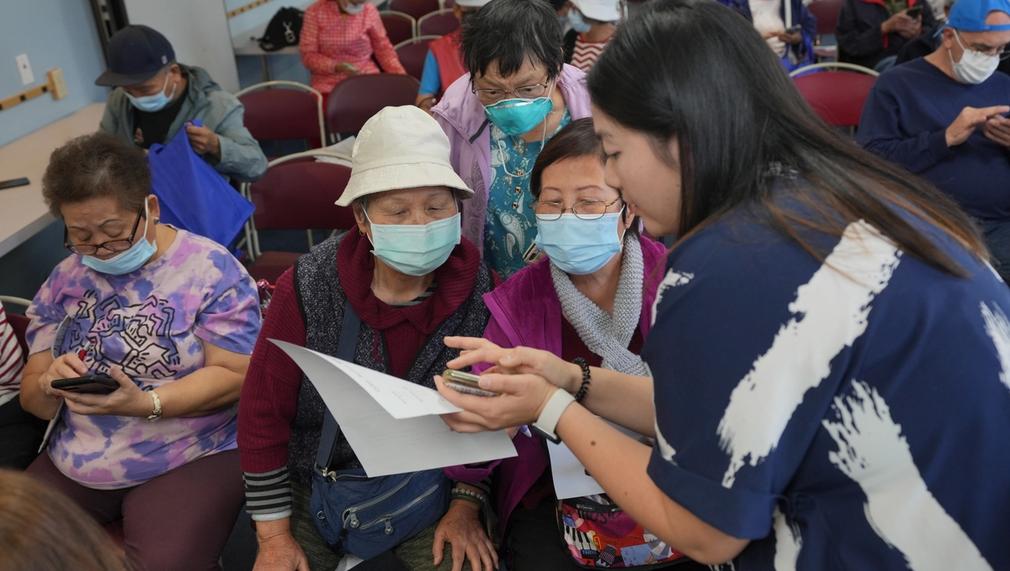Transit Technology: Accessing the Metro Virtually
Cyber-Seniors will create web-based content aimed at opening up the LA Metro's Virtual Services and Apps to Older Adults and create a large-scale outreach campaign to get “offline” Older Adults connected to free technology training.

What is the primary issue area that your application will impact?
Public transit
In what stage of innovation is this project, program, or initiative?
Expand existing project, program, or initiative (expanding and continuing ongoing, successful work)
What is your understanding of the issue that you are seeking to address?
Through Cyber-Seniors previous experience working with both the LA Metro and low-income older adults in Los Angeles, it is apparent that there are barriers in place that are not allowing older adults to have consistent access to the LA Metro's virtual services. Ridership is down across the Metro's 7 rail lines - currently sitting at 67% of pre-pandemic levels (LA Metro, 2024). To combat this, LA Metro is relying on older adults to utilize their TAP Cards which provide reduced fares for those 62 or older - $1.75 to just $0.75 during peak hours, or $0.35 during off-peak (LA Metro, LA Daily News). While this change is helpful in terms of reducing the price barrier, older adults need assistance in purchasing and reloading TAP Cards, which can be done conveniently through the web or through a smartphone or smartwatch. LA Metro and their older adult riders need assistance in creating tech-based training content and pushing it out to both online and offline older adults.
Describe the project, program, or initiative this grant will support to address the issue.
Cyber-Seniors has extensive experience training Los Angeles-based older adults with technology. As a partner of the CHAT program, Cyber-Seniors set up hundreds of older adults with free IPads, training them to become proficient and comfortable.
In 2022, Cyber-Seniors worked with LA Metro to provide both English and Spanish webinars covering transit-based topics for older adults which were very well received. As we move forward, we want to be able to provide this same experience for older adults who may not be as comfortable with technology. Cyber-Seniors will create an expanded webinar series covering topics such as the TAP LA app, how to purchase and reload a TAP Card, how to utilize transit apps, and virtual bus and rail tours exploring common routes. Cyber-Seniors' plans to work with Los Angeles-based volunteers to create this content, drawing from Cyber-Seniors' existing volunteer network as well as working with local high schools, youth organizations, and colleges to draw in new volunteers.
In order to ensure that the most vulnerable older adults are able to access the content, Cyber-Seniors will run a large-scale outreach campaign to senior centers, libraries, community centers and directly to older adults themselves. The outreach campaign will deliver information on where to access the webinar series, as well as how to utilize Cyber-Seniors’ no-cost general programming to get themselves online and improve their tech skills.
Describe how Los Angeles County will be different if your work is successful.
Cyber-Seniors envisions a comprehensive system whereby older adults are not only provided with educational resources covering the LA Transit system, but also receive the necessary tech training that enables them to use Metro's existing virtual services. For Cyber-Seniors, a successful program incorporates older adults' demand for tech training programs with the LA Metro's initiatives to get more older adults riding on transit. LA Metro has great initiatives in place to remove many of the barriers that older adults can face when taking transit. A successful collaboration between LA Metro and Cyber-Seniors will ensure older adults are made aware of these initiatives and begin to utilize them with greater frequency. By combining LA Metro’s transit-specific resources and Cyber-Seniors’ free, tech training services, we can create an all-encompassing project to increase the technological proficiency of hundreds of older adults.
What evidence do you have that this project, program, or initiative is or will be successful, and how will you define and measure success?
Cyber-Seniors uses the following scales to measure impact:
-Lubben Social Network Scale
-Behaviour and Use of the Internet Scale
-Digital Competence Scale
The effectiveness of the Cyber-Seniors program has also been independently evaluated and documented in scientific publications (Breck et al., 2018; Leedahl et al., 2019). Seniors who participated in the Cyber-Seniors program complete pre- and post-program surveys. This analysis found that seniors experienced a significant improvement in their ability and their interest in technology and showed significant reductions in social isolation scores. Data from impact surveys in 2022 also demonstrated a significant increase in the frequency of desktop and tablet use and a substantial increase in the number of purposes for using technology. Data also supported the fact that Cyber-Seniors’ programs effectively addresses social isolation, as evidenced by a significant reduction in loneliness after participation (Chignell & Zhi Hu, 2022).
Approximately how many people will be impacted by this project, program, or initiative?
Direct Impact: 250.0
Indirect Impact: 500.0